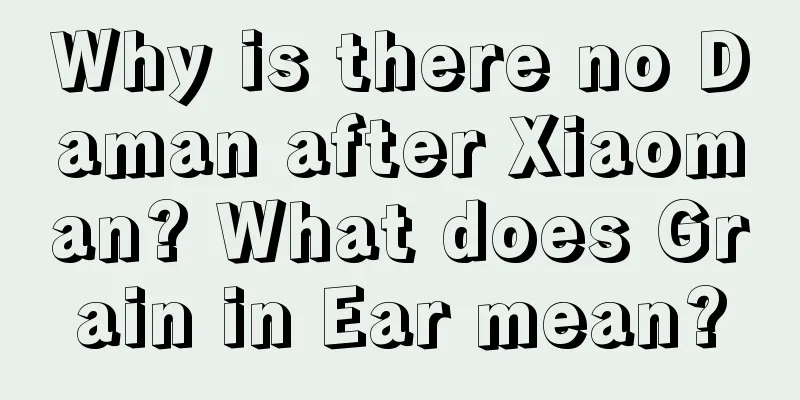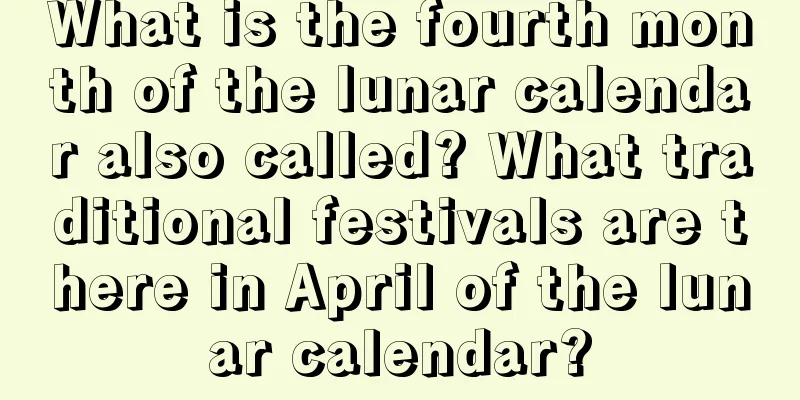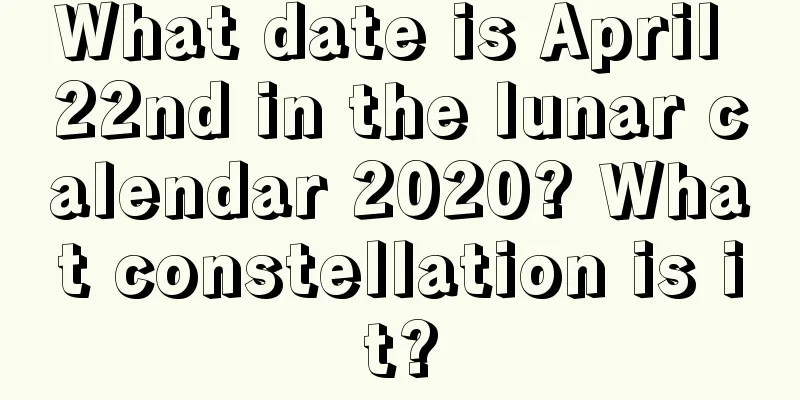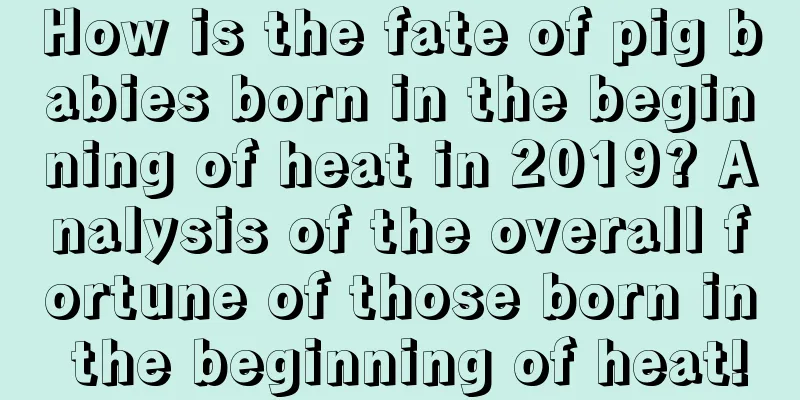Why is there no Daman after Xiaoman? What does Grain in Ear mean?

We know that many Chinese solar terms are divided into "big and small", such as "Minor Heat and Greater Heat" and "Minor Snow and Greater Snow", so why is there no Greater Snow after Minor Heat? Let’s find out together. In the blink of an eye, we have entered the fourth month of the lunar calendar. It is early summer now, the temperature is rising, and the weather is getting hotter. The Fortune Teller website will take you to experience the wonderful fourth month of the lunar calendar in 2018.Why is there no Daman after Xiaoman?Among the 24 solar terms, "Xiaoman" and "Mangzhong" not only do not correspond to each other literally, but their meanings are also the least direct among all the solar terms. Most of the 24 solar terms are named after the characteristics of climate and environment. Only "Xiaoman" and "Mangzhong" are special and the most difficult to understand.The ancients had long been aware of this. Ma Yongqing of the Song Dynasty recorded their doubts in his book Lazy True Son: "The names of the 24 solar terms can all be explained, except for Grain in Ear and Grain in Ear, which have different interpretations." Lang Ying of the Ming Dynasty raised a more direct question in the entry "Grain in Ear and Grain in Ear" in his book Seven Revisions of Classified Drafts: Heaven and Earth: "The 24 solar terms include Lesser Heat, Greater Heat, Lesser Cold, Greater Cold, Lesser Snow, and Greater Snow. Why is there Lesser Heat but no Greater Heat?" The ancient almanac states: "The finger of the Dou is the Grain Full, and all things grow but are not fully grown at this time. Wheat reaches Grain Full at this time but is not fully ripe, hence the name." For "Mangzhong", the explanation given in the "Collection of Explanations of the 72 Seasonal Changes" is: "The festival in May, when the grains with awns can be planted." This explanation is easy to understand from the literal meaning, that is, by the Grain Full season, wheat is almost ripe but not fully ripe; when Grain in Ear arrives, grains with awns should be planted. But if you look deeper, this statement also has problems. From Xiaoman to Mangzhong, the wheat has matured, the rice has been planted, and other crops have entered a rapid growth period, and there is no "planting" phenomenon. The ancients always hoped for a reasonable explanation for this. In "Yanbao Outan" by Gu Yuanqing of the Ming Dynasty, it is believed that the two solar terms, Grain Full and Mangzhong, "both refer to wheat", meaning that they both refer to the maturity and harvest of wheat. The statement in "Yanbao Outan" is actually the viewpoint of people in the Song Dynasty. The book "Lazy True Son" says: "They all refer to wheat. Grain in Ear is the fifth month of the lunar calendar, and the wheat is ripe at this time. Grain in Ear is the fifth month of the lunar calendar, and the word '种' is pronounced like '种' in '种', which means that the wheat with awns is wheat, and it should be ripe by this time." The term "Mangzhong" first appeared in the pre-Qin period. The "Rice Man" entry in "The Book of Zhou: Land Official", which reflects the political and economic system of the Zhou Dynasty, records: "Work in the fields...where grass grows in the marsh, plant it in Grain in Ear." The "Mangzhong" here refers to "wheat and rice", meaning that wheat and rice can be planted in any paddy field where grass can grow. Ma Yongqing gave a further explanation for this phenomenon in his book "Lazy True Son": The reason why the "grain in ear" solar term is not named "big man" which corresponds to "small man" is to remind farmers to pay attention to agricultural production, that is, "the ancients named the festivals to tell farmers the early and late seasons." Because "wheat can only be harvested at this time, and rice can no longer be planted after this time." What does Grain in Ear mean?"Mangzhong" means the maturity of awned crops such as wheat, meaning that the seeds of awned crops such as barley and wheat are ripe and it is urgent to harvest them."The May Festival means that the grains with awns can be planted." It means that the seeds of awned crops such as barley and wheat are ripe and it is urgent to harvest them. It is also the busiest season for sowing summer crops such as late rice, millet and sorghum, so it is also called "Mangzhong". |
<<: Which solar term is Xiaoman among the 24 solar terms? What does it symbolize?
>>: Will it rain during the Grain Full solar term? What does the rain during Grain Full represent?
Recommend
Do you know these taboos on the Lantern Festival on the 15th day of the first lunar month?
Introduction: The Lantern Festival can be said to ...
Is it a bad idea to offer sacrifices on the tenth day of the third lunar month in 2018? What should we pay attention to before offering sacrifices?
Traditional sacrifice refers to sacrifice to the g...
Are people born on the Autumnal Equinox in 2019 pure yin destiny? What is pure yin destiny?
The Autumnal Equinox in 2019 is on September 23. S...
What is the fate of a girl born in the beginning of autumn in 2018? Are they born to bring good luck to their husbands?
Introduction: The birth of a child is a big event ...
Is it a good idea to hold the funeral on the 25th day of the 12th lunar month in 2018?
In a person's life, there will always be birth...
Is April 29th of the lunar calendar in 2018 suitable for traveling? What should I pay attention to?
Traveling is a big or small thing for people. Some...
Is the lunar calendar for Minor Cold in 2018 a good date? Is it suitable for travel?
Introduction: Not only does each day unfold in dif...
Is it a good time to move into new house on August 27, 2020 in the lunar calendar? Is this an auspicious day?
The eighth month of the lunar calendar is Mid-Aut...
Is the 28th day of the sixth lunar month in 2019 a good day? Is it suitable for signing a contract?
Every day is different. Is the 28th day of the six...
What are the missing five elements of a boy born on October 14, 2020, the day before the Lower Yuan Festival, and how is his fortune?
Introduction: Children born on different days have...
What day is the day before Grain Full in 2020? Will it rain during Grain Full in 2020?
Introduction: Grain Man is one of the 24 solar ter...
Is the eighth day of the ninth lunar month in 2022 an auspicious day? What are the key points of fortune?
Since ancient times, my country has had the habit ...
Is the Spring Festival in 2021 not suitable for engagement? Should I go to my mother-in-law's house to celebrate the Spring Festival before the Spring Festival?
Introduction: Dachun means the beginning of spring...
Will hospitals be open as usual during the National Day in 2021? Can I have surgery on National Day? Which units do not have holidays?
The National Day holiday is also known as the Gold...
List of God of Wealth's location on August 25, National Day, 2021
The eighth month of the lunar calendar is the seco...









